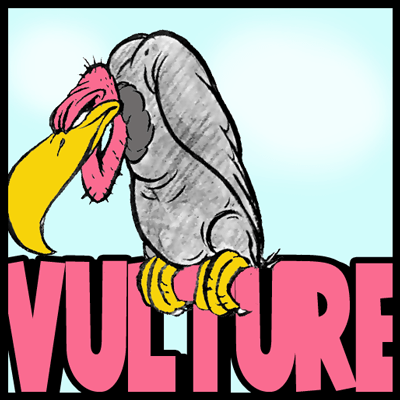One of the most common vultures found in North America today is the Turkey Vulture (Cathartes aura). I'm sure you have all seen them before, though you may not have realized it. If you ever watch the sky on a nice sunny day with little wind you can usually find dark birds circling up in the sky. The turkey vulture is one of the easiest birds to identify in flight. They make a "V" shaped silhouette and they can seem wobbly as they soar. The underside of their wings is two toned where the upper is a dark brown to black and the lower a beautiful silvery color.
Another awesome characteristic is the Turkey Vulture's sense of smell. (Most bird species lack or have a very limited sense of smell.) They can pick up scents of carcasses from long distances. They use their sense of smell and eyesight to locate food sources.
Fun fact: If you look at the profile of the Turkey Vulture you can see through one nostril and out the other!
Now I've been pretty clean about vultures so far, but hear is your warning for it's about to get gross!
.
.
.
.
.
.
.
.
.
.
.
.
.
.
.
.
Turkey Vultures have their own built in defenses, and I have to say it is very effective! If a TV is trapped by a predator or feels threatened they can vomit. Now imagine what vultures eat and picture it digesting for a while. Yup, I would not want to mess with a vulture. There are multiple theories as to why they vomit, and I'm sure they all play a part. If the vulture vomits, it decreases the bird's weight for an easier escape flight. The vomit could also be a distraction to deter the predator or possibly feed the predator so the TV can get away. (I hope no one has been eating while reading this!)
Turkey Vultures also poop on their legs! Originally it was thought to be a cooling mechanism, but research indicates there might be more to it. Their urine is acidic and can prevent the spread of harmful bacteria which would be very helpful since they stand on decaying carcasses to feed.
These unique characteristics although gross are helpful for the vulture's role in the environment. They help clean up. All the road kill and lost game from hunting would take days to weeks to decompose without a vulture's help. Imagine road kill piling up and the spread of bacteria and disease. I'm quite thankful we have vultures!
I've only worked with turkey vultures when I was researching Bald Eagles because they both shared a love of dead nutria. They would fly into a bait site so gracefully and in such large numbers, they would always end up putting on a show! I remember a few times where we had at least 30+ vultures (TVs and Black Vultures) and within two hours our bait was gone. It was bad for catching eagles, but impressive to watch all the same. When I've been up close to TVs their skin is actually a pretty pink red color and their beak is a pearly white. They were very clean and their feathers were very soft. I was also lucky enough that they didn't see me as a threat so I was saved from the vomit!
I hope this sheds some light on what a Turkey Vulture is really like. Like the title says, beauty is in the eye of the beholder, and I for one find the Turkey Vulture to be a beautiful bird!
For more on vultures around the world check out this awesome video from The Peregrine Fund. The speaker is Munir Virani, the Africa Programs Director for TPF.
Vulture Comic courtesy of www.birdandmoon.com

_-in_flight.jpg)


No comments:
Post a Comment